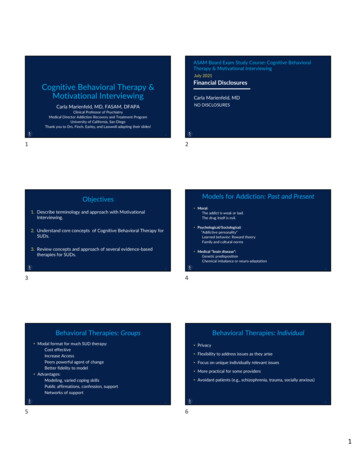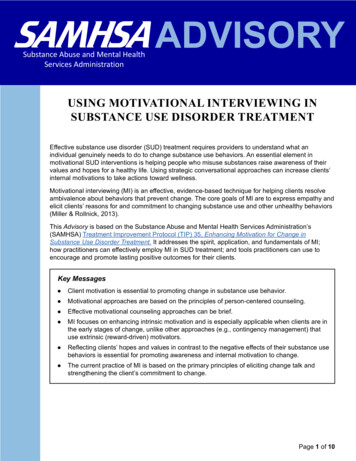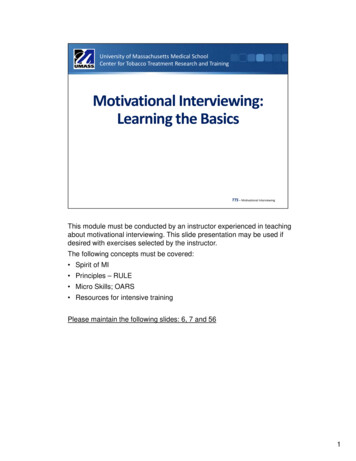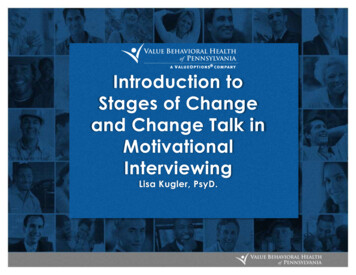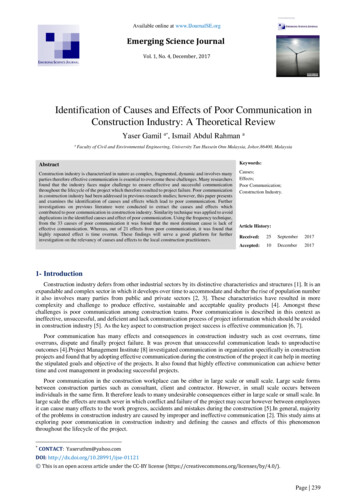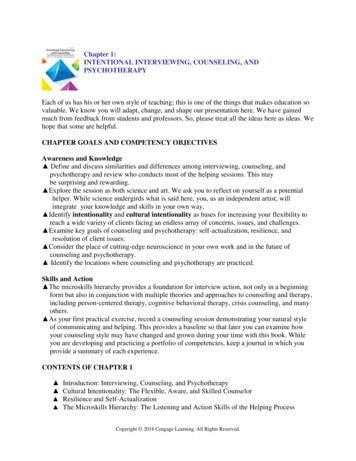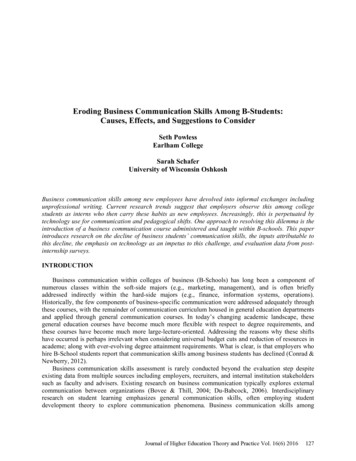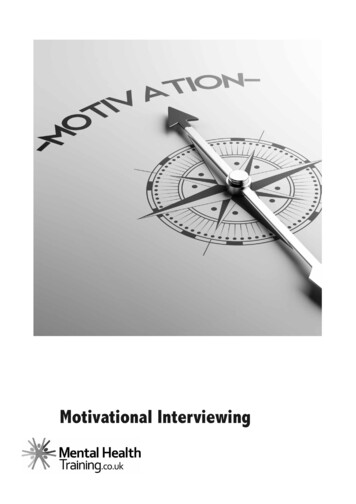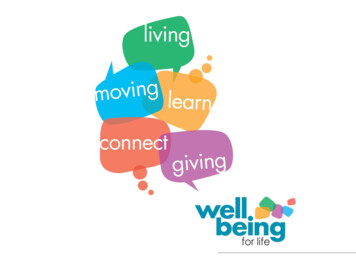
Transcription
Motivational Interviewingand CommunicationSkills
Group RulesKeep sound onBe present – don’t be distracted byemailsGet involvedEveryone is different. Be kindEvaluate at the end
ObjectivesTo identify appropriate communicationmethods and how these can be utilisedeffectivelyExplore the role of active listening incommunicationTo understand how motivational skills can beapplied in supporting people to change
Introduce yourself
Definition of Communication
Definition
How not to do it!!!!https://youtu.be/ VlvanBFkvI
ActivityBreakout rooms – 10minsWhat do you think about the interviewerand his style, what’s good and what isnot so good?What are the main forms ofcommunication?
Written communicationToday, when anyone can be their ownpublisher, we see more and moreexamples of poor writing skills both inprint and on the web.Poor writing skills create poor firstimpressions and many readers willhave an immediate negative reaction ifthey spot a spelling or grammaticalmistake.
England Literacy levels (2012)16.4% of adults in England, or 7.1million people, can be described ashaving 'very poor literacy skills’Current Population is 66-67 Million (ons)99% literacy rate (UNA) 665,000
This is a true storyA two-year-old is diagnosed with aninner ear infection and prescribed anantibiotic by her doctor. Her motherunderstands that her daughter shouldtake the prescribed medicine twice aday.What do you think happens next
After carefully studying the label on thebottle and deciding that it doesn’t tellhow to take the medicine, she fills ateaspoon and pours it into herdaughter’s painful ear.(Parker et al 2003)
Mass Media - Remember!Is it appropriateRemembering that it’s forever/ footprint!Positive/ Negatives
Communication SkillsWhat are the three main forms ofcommunication?Words7%Tone/ InflectionNon Verbal38%55%
Non verbalcommunicationBody Movements (Kinesics)PostureEye ContactCloseness or Personal SpaceFacial Expressions
Verbal communicationEffective verbal or spoken communication isdependent on a number of factors andcannot be fully isolated from other importantinterpersonal skills such as non-verbal,communication, listening skills and reflection.Clarity of speech, remaining calm andfocused will all aid the process of verbalcommunication.Also the use of tone, inflection, pitch andspeed.
Speaking, pitch and tone“We all need to gather ourpossessions and move toanother building as soon aspossible”
The importance ofListening
Active listeningNon verbalSmileEye ContactPostureMirroringDistraction
Active listeningVerbalPositive rificationSummarising
Strategies for Active listeningPrepare to hear the messageSuspend judgementExpect to be interestedListen to the entire messageListen for new information/ideasRecognise internal distractions andrefocusConcentrate
Client first appointmenthttps://youtu.be/MixAphYLZy0
Breakout roomsWhat were the differences between thefirst and second videos?What techniques did Dr Selby use thatyou noticed with the client?
Key skills associated withmotivational interviewingActive listeningAffirmation and acceptanceTo elicit and reinforce client’s own selfmotivational statementsAssess readiness to change and not to “jumpahead” of clientAllows client freedom of choice and selfdirection
“MI with someone is like entering their home.One should enter with respect, interest andkindness, affirm what is good, and refrainfrom providing unsolicited advice andrearranging their furniture.”(An Alaskan elder reflecting on an MI workshop by Steve Berg-Smith)
Client second appointmenthttps://youtu.be/ X2xXvC7QPs
How would you direct a clientto thinking about what’s next?“What do you think you want to do?”“What are you thinking of at this moment?”“What changes, if any, are you thinkingabout making at this point?”“What could you do first?”“What are your options here?”
Technical skills in MI - OARSOpen-ended questions- encourage client to open upAffirmations- feedback strengths and abilitiesReflection Listening- to convey clients are heard & understoodSummaries- are special applications of reflective listening.They can be used throughout a conversation butare particularly helpful at transition points(Adapted from handouts by David Rosengren and from Miller & Rollnick, MotivationalInterviewing, 2nd Edition, 2002)
Open QuestionsCannot be answered in one wordCreates forward moving momentumEncourages clients to talk and expressthemselvesHelps establish an atmosphere of trustand acceptance by allowing client to domost of the talkingAsking is not the same as listening!
Whiteboard - words to use inopen ended questionsHowWhatWhereWhyWhenExplainDescribeTell meSometimes there is no doubt that we justneed the one word answer but a lot of thetime we need to delve further and that iswhen we use these words.
Converting closed questionsQ: Did you have a good day at school/work today?A: What did you talk about at lunchtoday?
Finding affirmations((adapted from Rosengren, 2009)A young man stands in front of the juvenilecourt for the third time in less than a year. Hewas arrested for possessing marijuana. He washanging around on a street corner with hisfriends when a group of college students startedhassling them. He jumped in and a brawlensued. As the police arrived to break up thefight, his marijuana fell out of his pocket. Hetakes an insolent attitude into the court roomeach time he is there.
Finding affirmations .contStrengthsDefends his friendWilling to stand up for himself, even if itcosts himAffirmationYou are a loyal friend, willing to defendothers, even when it causes you trouble
Reflective Listening“Even when I reflect inaccurately, it givesthe other person the chance to correctme, and so I can still wind up in a goodplace – correctly understanding the otherperson.”
Reflective Listening Levels Repeating or rephrasing: Listener repeatsor substitutes synonyms or phrases, andstays close to what the speaker has said Paraphrasing: Listener makes arestatement in which the speaker’s meaningis inferred Reflection of feeling: Listener emphasizesemotional aspects of communication throughfeeling statements. This is the deepest formof listening.
Behaviour change is not easy
Decisional Balance
Dilemma & AmbivalenceChange TalkBENEFITS OF CHANGE& COSTS OF STAYINGTHE SAMESustain Talk &(Resistance)BENEFITS OF STAYINGTHE SAME & COSTSOF CHANGE
Breakout roomUsing motivational skills how would youdeal with a client who is expressingsustain talk –none of my family exercise, I will be all onmy own, I don’t have any trainers.
Final videohttps://youtu.be/NlnkvHo6uj0
Scaling rulers – importance,confidence, readiness0-101-101-3What percentage %
Benefits of Goal setting
Motivational interviewing information and adviceMI is not incompatible with giving adviceRather, it is the context within which theinformation is exchangedTwo circumstances exist when advice should begiven;When the client requests itWhen permission is given
SummaryMI is an intervention which emphasises:Identifying resistanceResolving ambivalenceActive listeningUsing open ended questions to exploreclient’s readiness to changeGoal Setting
Ask yourselves - Are youdancing or wrestling?MI can be seen as two peoplemoving together in partnershiplike dancers. When done wellthe movement unfolds.In wrestling one grapplerattempts to assert their will overtheir opponent.
Thank you
Verbal communication Effective verbal or spoken communication is dependent on a number of factors and cannot be fully isolated from other important interpersonal skills such as non-verbal, communication, listening skills and reflection. Clarity of speech, remaining calm and focused will all aid the process of verbal communication.
